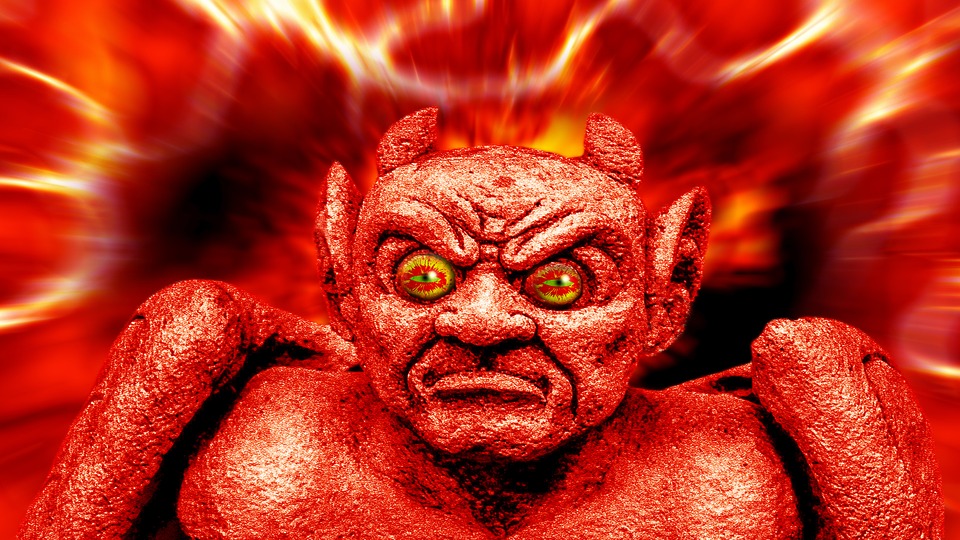Demons are a part of the Christian Worldview. They are talked about in various places in scripture, particularly in The New Testament. Isaiah 14:12-15 and Ezekiel 28:13-19 describe the fall of Satan and the other fallen angels, saying that they were once good angels who loved and served God, but became corrupted by pride and envy and decided to rebel against God, attempting to dethrone him and make Satan the King of kings and Lord of lords. These passages say their plan backfired, as God fought back, won, and cast them out of Heaven. Jesus recounts in Luke 10:18 how He witnessed Satan fall like lightning from Heaven, which is the same events the passage in Isaiah and Ezekiel wrote of. Like angels, the existence, powers, and work of demons are very interesting. But they’re shrouded in theological questions. For example, is Satan omnipresent? If not, how can he tempt so many people? Is Satan the king of Hell? Does he punish people in the afterlife? If so, how can he really be considered evil? Isn’t it superstitious to believe that demonic beings cause effects in our world? Isn’t the demonic an outdated pre-scientific belief that only uneducated people believe in? These are some of the questions I’d like to answer in this blog post.
I feel a little uneasy writing this article, as I don’t like dwelling on demons very much. Philippians 4:8 tells us “Whatever is true, whatever is noble, whatever is right, whatever is pure, whatever is lovely, whatever is admirable-if anything is excellent or praiseworthy-think about such things.” Demons certainly don’t fit that description! And C.S Lewis wrote: “There are two equal and opposite errors into which our race can fall about the devils. One is to disbelieve in their existence. The other is to believe, and to feel an excessive and unhealthy interest in them. They themselves are equally pleased by both errors and hail a materialist or a magician with the same delight.” So we mustn’t spend more time than is necessary reflecting about the demonic, but we do need to reflect on them some, since, as I said, they are a part of the Christian worldview.
Question 1: Is Satan Omnipresent, And If Not, How Can He Tempt So Many People Around The World?
There is no evidence in The Bible whatsoever that Satan is omnipresent. In fact, quite the opposite. In the book of Job, when Satan stands before God and God asks him where he’s been, he replies “From roaming throughout the earth, going back and forth on it.” (see Job 1:6-7). Moreover, 1 Peter 5:8 says “Be sober-minded and alert. Your adversary the devil prowls around like a roaring lion, seeking someone to devour.” Satan roams the Earth. He isn’t everywhere at once. Job 1 and 1 Peter 5 say that Satan goes from place to place. He walks “back and forth” on our planet. Such language implies that Satan isn’t everywhere at once. If he were, he could not be at Point A at T-1, and then move to point B at T-2. Not only could he not, but he wouldn’t need to. For he would already be a point A and point B simultaneously at T-1. Therefore, since Job 1:6-7 and 1 Peter 5:8 say that Satan “roams the Earth”, this implies that he moves from point A to point B to point C, at isn’t at A, B, and C simultaneously. Satan is not omnipresent. Moreover, the fact that Isaiah 14:12-15, Ezekiel 28:13-19, and Revelation 12 teach that Satan was cast out of Heaven implies that Satan cannot be both inside of Heaven and outside of Heaven at the same time.
But if Satan can’t be everywhere at once, how is he able to tempt so many people into sin all over the world? Well, for one thing, Satan isn’t the only source of temptation. We have the sin nature (Romans 7:7-24, Galatians 5:17, Galatians 5:19-21, Ephesians 2:3) and the world (Proverbs 1:10, 1 Corinthians 15:33-34, Romans 12:2, 9) to contend with as well. We have a triple threat to our souls: “mundus, caro, et diabolus;” or “The world, the flesh, and the devil”. It is not merely Satan we need to be on guard against: but our sinful natures, and the influence of society as well. Our own inherent depravity can drag us down the wrong path, and as Proverbs 1:10 indicates, temptations to sin come from our fellow man as well.
Besides this, in the “the devil” category of “The world, the flesh, and the devil”, there’s more than simply one devil. The Bible tells us that Satan persuaded one third of the angels to rebel against God with him: “Then another sign appeared in heaven: an enormous red dragon with seven heads and ten horns and seven crowns on his heads. His tail swept a third of the stars out of the sky and flung them to the earth… And there was war in heaven. Michael and his angels fought against the dragon, and the dragon and his angels fought back. But he was not strong enough, and they lost their place in heaven. The great dragon was hurled down–that ancient serpent called the devil, or Satan, who leads the whole world astray. He was hurled to the earth, and his angels with him.” (Revelation 12:3-9).
So Satan isn’t the only fallen angel around. How many angels is 1 third of the sum total of angels? We can’t really say for sure. Since the number of angels is “innumerable” (Hebrews 12:22), one-third includes a vast number of demons who have rebelled against God. When we read Mark 5, we learn of a man who called himself Legion, and this individual was possessed by so many evil spirits that when Jesus cast them out of the man, they entered the bodies of 2,000 pigs and caused them to jump off a cliff (Mark 5:9-13)! Luke 8:2 tells us that Mary Magdalene was freed from seven spirits. Jesus also mentioned another account of seven spirits together at one time (Matthew 12:45; Luke 11:26).
Due to this, I’m often hesitant to say things like “The devil is trying to steal my joy” or “The devil is trying to make me doubt my faith” or “The devil is trying to fill my head with blasphemous thoughts”. The word “the” indicates that there’s only one devil; Satan. That is not the case.
Given that Satan cannot be everywhere at once, it’s very unlikely that I, Evan Minton, have ever gone toe to toe with him. I have indeed gone to war against devils since the time of my teens, but the head honcho himself, Satan, I doubt I’ve ever faced. It is more reasonable to think that it was only his underlings I’ve contended with.
Question 2: Do Random Demons Tempt Us Or Do Demons Assign Themselves To People?
I don’t know if this question has been asked by other people (though it probably has), but this was a question I myself have raised. When I am tempted to sin by “the devil”, is it just some random demon who happened to come across me and thought to him or herself “Here’s a nice chap. Let me see what immorality I can get him to do”? Or is it the case that demons take it upon themselves to dedicate their lives to enticing one individual to commit various sins, with the ultimate goal of bringing spiritual and everlasting destruction upon them? In the latter case, it would be like the opposite of a guardian angel. Just as many believe God assigns individual angels to guide and protect individual humans throughout their entire lives, it may be the case that Satan assigns individual demons to tempt and entice individuals humans. An Anti-Guardian Angel if you will.
Which of these possibilities is correct? The Bible is silent on this matter. You won’t find out which one, if either, is correct in the pages of holy scripture. Given that that’s the case, I think we’re free to speculate on the matter.
I happen to find the latter more plausible, and here’s why: In order to be the most effective at leading people away from God, one must really get to know the person. Imagine for a moment that you are a demon. If you knew what made a person tick, you would have a higher chance of success than if you knew nothing about them at all. If I know a person is a Christian man who struggles with homosexual desire, I would be sure to bring the most attractive (and the most promiscuous) person of the same sex into their lives. This individual would be the most effective stumbling block. But if I knew nothing about him, I could bring the promiscuous person into his life and it might have no effect because the man I’m trying to tempt is as straight as an arrow! If I were a demon, it would behoove me to really get to know my “client” so that I would know what he’s most susceptible to.
So, I think it’s vastly more plausible to think that people literally have their own demons to fight than to think that people have random encounters. I don’t know for this certain and I’m quite willing to dismiss this view if given good reason to, but this is what I think is what’s most plausible.
Question 3: Is Satan The King Of Hell? Does He Punish People In The Afterlife? If So, How Can He Be Considered Evil?
I blame cartoons and comics for some of the peoples’ misconceptions about Heaven, Hell, and the devil. I remember seeing an episode of Tom and Jerry when I was a kid, where Tom died and went to the gates of Heaven. St. Peter wouldn’t let him in because he had spent his entire life terrorizing a mouse, so he gave him one more day on Earth to make things right with Jerry. He tried his best, but Jerry was a little prick (understandable given what Tom put him through), so Tom failed at being nice to him. He ended up going to Hell and being tormented by Satan in a boiling cauldron. And every time Tom tried to escape, the devil would yank him back in. Tom woke up to realize the whole thing was a nightmare. Other depictions of Satan in other works of fiction have also painted him as this being who rules Hell and actually is the one to dish out the punishment to the people who end up there. This depiction became so common that it’s understandable that some people might assume that this is what The Bible teaches. However, it is not.
No, Satan is not the king of Hell and no, he does not punish people in the afterlife. The Bible says that God is the Being who will cast Satan, also called the devil, into the “lake of fire and brimstone” to be “tormented forever and ever” (Revelation 20:2,10). Moreover, Matthew 25:41 says that the “eternal fire” (i.e Hell) was “prepared for the devil and his angels.” The passages of The Bible debunk the idea that Satan is the king of Hell and tells us that he himself is a prisoner there.
Question 4: Isn’t Believing In The Devil A Pre-Scientific Belief That Only Superstitious And Uneducated People Believe?
In the United States, we’ve become an extremely secularized society. The common belief is that only natural causes are at work and any appeal to God or the devil as a cause for any event is seen to be superstitious, silly, and/or anti-science. But this question is really complex and there are actually a couple of different issues in this one question which need to be addressed separately. First, we need to talk about whether we have epistemological warrant for concluding that demons even exist in the first place, then we need to talk about when or if we’re ever warranted in attributing activity to them.
*The Existence Of Demons Is Warranted Because Christianity Is Demonstrably True
I believe Satan and other demons exist because they are part of the Christian worldview. They are taught by The Bible. I know the Christian worldview is true because The Bible says it is true. I know that The Bible is a source that can be believed because we have several good reasons to think it is. One reason would be “The Divine Identity Argument” which I talk about in my blog post “The Divine Identity Argument For Christianity”. This argument takes the various Natural Theology arguments (e.g The Moral Argument, The Ontological Argument), looks at the description of God from The Bible, and concludes based on the logical law of identity that the God Of Natural Theology and The God Of The Bible are one in the same. This inference is strengthened by the fact that none of the other gods in any other religions even come close to having the same properties as the God of Natural Theology.
Given that “The God Of Natural Theology” and The God Of The Bible have exactly the same attributes, and since none of the polytheistic, pantheistic, or Deistic gods even come close to looking like the God of these arguments, the most reasonable explanation is that The God proven to exist by these arguments and the God of The Bible are one in the same being. Now, given that, it’s a quick inference to the Bible’s inspiration. Here’s why I say that: if The Bible were purely a human book written by human men just making stuff up, it is extremely improbable that they would make up a God who is exactly like the God of the Cosmological, Teleological, Moral, and Ontological Arguments. Why didn’t their allegedly made up god fall short like gods in the rest of the religious writings of the world? The reason is that the God of the Cosmological, Teleological, Moral, and Ontological Arguments (i.e The God of Natural Theology) inspired the writers of The Bible. That’s why they describe Him perfectly. The God Of Natural Theology inspired The Bible’s authors.
Now, given that The Bible is inspired by this being (who is perfect, as evidenced by the Moral and Ontological Arguments), then whatever He says must be the truth. Morally perfect beings cannot lie, but will always tell you the truth. The Bible tells us that demons exist. So it follows that demons exist.
“The Divine Identity Argument” for Christianity infers that The God Of The Bible exists (and by extension, The Bible’s inspiration) by looking at arguments for God’s existence common to those in the field of Christian Apologetics, looking at The Bible’s description of God, and using the logical law of identity to infer that they are one in the same. I could only briefly explain my reasoning here. I couldn’t go into defending the premises of the arguments at all, in fact, I couldn’t even list the premises. It is beyond the scope of this blog post to do so. Those interested in an in-depth treatise of The Divine Identity Argument are recommended to read my book on the subject titled: Inference To The One True God: Why I Believe In Jesus Instead Of Other Gods. The arguments listed in this blog post are also defended in various articles on this site, but they don’t do so within the context of The Divine Identity Argument like my book does. Click here to buy the book.
Another reason to believe The Bible’s inspiration comes from the resurrection of Jesus. The historical evidence demonstrates that Jesus claimed to be God and then died and rose from the dead. If Jesus claimed to be God but He really wasn’t, then God would never raise Jesus from the dead given that He knew that that would vindicate Jesus’ claims. Given that Jesus rose from the dead, that means that God put His stamp of approval on Jesus’ ministry. Given this, we can put stock into all of Jesus’ spiritual teachings. What did Jesus teach? He taught that The Old Testament was divinely inspired. Who would know better whether The Old Testament is inspired than God Himself? Moreover, Jesus Himself handpicked the authors of The New Testament, so that gives us good reasons to trust the NT’s contents as well. Jesus also taught that demons existed. Since Jesus taught these things, we can believe them, because He’s God. He proved He was God by rising from dead. This is why you’ll sometimes hear apologists say “I don’t believe in Jesus because I believe The Bible. I believe The Bible because I believe in Jesus.” Now, again, it is beyond the scope of this article to deal with the actual reasons behind the facts undergirding this inference, but I do talk about the historical evidence in blog posts such as “The Minimal Facts Case For Jesus’ Resurrection PART 1″ and “The Minimal Facts Case For Jesus’ Resurrection PART 2” but if those are too lengthy for you, check out “A Quick Case For Jesus’ Resurrection”.
Given all that I’ve said, I think we are within our rational rights to believe that demons exist and that they do stuff in the world.
*Believing That Demons Exist Isn’t Superstitious, But Attributing EVERYTHING To Them Is
One of the things I’ve witnessed in the average Christian is to attribute everything to the devil. I remember tweeting once that I caught a cold at a concert I had attended, and a girl replied to that tweet saying that the devil was making me sick to keep me from doing God’s work, followed by telling me that she would pray for me. While I appreciated her prayers, her comment struck me as odd. I was like “Really? I doubt it. I think it’s more likely that germs are the cause rather than the hand of a demon.” I’ve heard Christians blame “the devil” on their automobiles not working, their marriages going bad, their sicknesses, when they lost their jobs, and many other things.
As I argued above, we have good evidence (albeit indirect) that demons exist, and it isn’t superstitious or unscientific to believe that. However, what is superstitious to attribute every single misfortune you have to their hands. Richard Bushey talked about this in his blog post “How To Practice Religion Without Being Superstitious”. He writes: “The problem with attributing everything to the unseen realm is not that there is no unseen realm. It is that it is difficult to discern whether something is a product of the unseen realm. Perhaps the person with whom you disagree is just mistaken. If there are other, plausible explanations available, and the unseen realm is a superfluous addition, then there is no reason to give assent to that belief. For somebody to give assent to it would seem to be a little too superstitious for my taste. Yet you can believe in the unseen realm without being superstitious about it. You would just need discernment.”
I agree with Richard. We need to resort to natural explanations unless we have very good reasons to think a devil is involved. I adhere to a methodology called Soft Methodological Naturalism: which means I don’t invoke the supernatural unless no natural explanations are viable. If natural explanations are viable, then I go with one of those. In the case of my cold, a natural explanation was available: germs were causing me to be sick. So even though I believed in demons, I rejected them as an explanation in favor of the germs hypothesis. I explain Soft Methodological Naturalism in more detail in my article “Are Christians Anti-Science?” Unlike hard methodological naturalism, soft methodological naturalism doesn’t rule out the supernatural entirely, it simply keeps them in reserve as a last resort explanation.
One of my problems regarding devils is that I tend to fall into the opposite error. On one end of the spectrum, you have Christians attributing everything to the devil. However, I tend to fall into the mistake of neglecting the demonic entirely; attributing nothing to demons, even in the areas where we would most likely expect it, such as temptation and impious thoughts. I’m more likely to blame my flesh than I am a demon. This is also a mistake, as The Bible tells us we’re at war with them Ephesians 6:11-17 says: “Put on the full armor of God, so that you can take your stand against the devil’s schemes. For our struggle is not against flesh and blood, but against the rulers, against the authorities, against the powers of this dark world and against the spiritual forces of evil in the heavenly realms. Therefore put on the full armor of God, so that when the day of evil comes, you may be able to stand your ground, and after you have done everything, to stand. Stand firm then, with the belt of truth buckled around your waist, with the breastplate of righteousness in place, and with your feet fitted with the readiness that comes from the gospel of peace. In addition to all this, take up the shield of faith, with which you can extinguish all the flaming arrows of the evil one. Take the helmet of salvation and the sword of the Spirit, which is the word of God.”
So while we shouldn’t be attributing everything to demons, we really need to be aware that they do interact with humanity, and they are a threat to our souls.
Conclusion
Hopefully, I’ve successfully answered any questions you have regarding demons.





